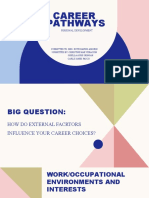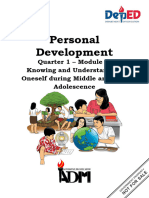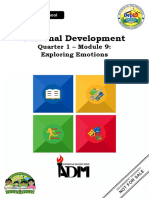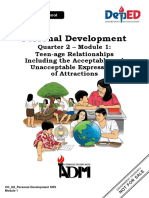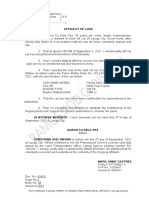Whole Brain Learning System Outcome-Based Education: Personal Development
Whole Brain Learning System Outcome-Based Education: Personal Development
Uploaded by
VERDADERO LevisthoneCopyright:
Available Formats
Whole Brain Learning System Outcome-Based Education: Personal Development
Whole Brain Learning System Outcome-Based Education: Personal Development
Uploaded by
VERDADERO LevisthoneOriginal Title
Copyright
Available Formats
Share this document
Did you find this document useful?
Is this content inappropriate?
Copyright:
Available Formats
Whole Brain Learning System Outcome-Based Education: Personal Development
Whole Brain Learning System Outcome-Based Education: Personal Development
Uploaded by
VERDADERO LevisthoneCopyright:
Available Formats
WHOLE BRAIN LEARNING SYSTEM
OUTCOME-BASED EDUCATION
PERSONAL GRADE
DEVELOPMENT 11/12
2
LEARNING QUARTER
MODULE WEEK 7
WBLS-OBE MELC-Aligned Self-Learning Module Personal Development 0
MODULE IN
PERSONAL DEVELOPMENT
11/12
QUARTER 2
WEEK 7
Career Pathways: External Factors
Affecting Career Choice Pros and
Cons of Some Career Choices
Development Teams
Writers: Liza A. Pagurayan Maybellinda G. Albano
Jayne E. Ventura
Editor: Julianne Grace B. Bugaoisan
Reviewer: Sherberk F. Cabrales
Layout Artist: Arsendio A. Cabacungan
Management Team:
Vilma D. Eda Arnel S. Bandiola
Lourdes B. Arucan Juanito V. Labao
Arsendio A. Cabacungan
WBLS-OBE MELC-Aligned Self-Learning Module Personal Development 1
What I Need to Know
What This Module is About
For the learner:
When you choose a career, there are many things that you need to consider: the kind of work
and its environment, the type of people you want to work with, the nature of the job and its
benefits, the skills and training needed, and the educational attainment required. These are only
few of the number of external factors which are creatively integrated to the deep insights and
factors in your personal development which may guide you in the planning and making of a
career decision as an adolescent.
With this module, you will explore the external factors and the insights of personal
development affecting your decision in choosing a career and identify the advantages and
disadvantages of your career options with the help of important people around you which you
may need to design a career plan based on your personal goals.
At the end of lesson, you will be able to:
1. discuss the external factors influencing career choices that may help you in career
decision making; (EsP-PD11/12CP-IIg-13.1)
2. identify pros and cons of various career options with the guidance of parent, teacher,
or counselor; and (EsP-PD11/12CP-IIg-13.2)
3. prepare a career plan based on your personal goal and external factors
influencing career choices. (EsP-PD11/12CP-IIg-13.3)
WBLS-OBE MELC-Aligned Self-Learning Module Personal Development 2
What I Know
PRE- TEST
Directions: Read the questions carefully and write the letter of the correct answer in answer sheet.
1. People who have athletic or mechanical ability, prefer to work with object, machines,
tools, plants and animals, or be outdoors. What category was described in the first
statement?
A. Artistic B. Investigative C. Realistic D. Social
2. They are the people who like to work with data, have clerical or numerical ability,
prefer to carry things out in detail or follow through on others’ instructions.
A. Artistic B. Conventional C. Realistic D. Social
3. People who like to work with people – influencing, persuading, performing,
leading, or managing for organizational goals or for economic gain.
A. Investigative B. Enterprising C. Social D. Realistic
4. People who like to observe, learn, investigate, analyze, evaluate or solve
problems.
A. Conventional B. Enterprising C. Investigative D. Realistic
5. People who have artistic, innovating, or intuitional abilities, and like to work in
unstructured situations using their imaginations or creativity.
A. Artistic B. Conventional C. Realistic D. Social
6. People who like to work with people – to inform, enlighten, help, train,
develop, or cure them or are skilled with words.
A. Artistic B. Conventional C. Realistic D. Social
7. An integrated collection of programs and services intended to develop student’s core
academic, technical and employability skills; provide them with continuous education,
training; and place them in high-demand, high- opportunity jobs.
A. Career Pathways B. Guidance and Counseling
C. Health and Wellness D. Sports Development
8. This will help sort out priorities in life. It may include short-term and long-term goals
or life-long aspirations.
A. Career Development B. Personal Mission Statement
C. Philosophy in Life D. Vision and Mission
9. It covers activities that improve awareness and identity, develop talents and
potential, build human capital and facilitate employability, enhance the quality of life
and contribute to the realization of dreams and aspirations.
A. Career Development B. Educational Plan
C. Community Development D. Personal Development
10. All are external factors influencing career choices except
A. Emotional Intelligence and Mental Health
B. Gender, Interest and Personality Type
C. Life Roles, Skills and Abilities, Culture
D. Previous Experiences and Childhood Fantasies
WBLS-OBE MELC-Aligned Self-Learning Module Personal Development 3
Lesson Career Pathways: External
1 Factors Affecting Career
Choice Pros and Cons of
Some Career Choices
Career decision and selection of career pathways remain to be a big problem for you,
your parents, and other authorities around you due to varied external factors, work
environments and interests affecting you in the process.
In this lesson, you will explore all these factors and study the advantages and
disadvantages of different working environments that will help you in your career planning and
development.
What’s In
In the previous lesson, you explored the personal or internal factors and the career
interest areas affecting your career choices, in order to understand further the concepts of career
and life goals which are relatively important in the planning of career development. To complete
the whole process, you need to explore the external factors influencing career choices that may
help you in career decision making, identify the advantages and disadvantages of career options
necessary to prepare for a career plan.
What’s New
Activity 1.1 Essay Writing – A Puzzled Mind …
Directions: Write an essay by answering all the questions below in no particular order. Create
your own title and write your answer in your journal notebook.
What do you want to be when you grow up? What is it important to you?
What affects your choices?
What hinders you to choose
What would you like to do?
WBLS-OBE MELC-Aligned Self-Learning Module Personal Development 4
What are you interested in? What do you need to know?
(Essay Title)
What is It
What influences Your Career Choices?
There are a lot of external factors to consider in career development. As you go through the
different factors below, you will see how they affect or influence your career choices. You will
also identify which among these factors have least and big impact to your career options.
Skills and Abilities
Skills and abilities are the things you naturally do well, talents and strengths that you
possess. These can include natural capabilities you've always had or acquired through
experience and training.
Interest and Personality Type
Are your interests and personality type compatible with your career choice? You need
to know what makes you happy and be motivated every day. Learning about your interest and
personality leads you to better choose a working environment that fits you.
Life Roles
You play multiple roles in your lives and that these roles change over the course of
time. How you think about yourself on these roles may influence how you look at careers in
general and how you make choices for yourself.
WBLS-OBE MELC-Aligned Self-Learning Module Personal Development
5
Previous Experiences
Having positive experiences and role models working in specific careers may influence
you on the set of careers you consider as options for yourself. If you have proven success and
achieved positive self-esteem in a particular area of work, more likely, you will have it as a top
career option.
Culture
Racial and ethnic background, as well as the culture of your local community, and
extended family, may impact career your decisions. Culture often shapes your values and
expectations as they relate to many parts of your lives, including jobs and careers.
Gender
How you view yourself as an individual in terms of gender may influence both the
opportunities and obstacles you perceive as you make career decisions. Studies of gender and
career development are ongoing as the roles of men and women in the workplace evolve.
Social and Economic Conditions
All of your career choices take place within the context of society and the economy.
Changes in the economy and the resulting job market may also affect how your careers develop.
Childhood Fantasies
What do you want to be when you grow-up? You can remember this question during
your childhood years, and it may have influenced your thoughts about careers, then, as well as
in the present moment.
1. Department of Education, Republic of the Philippines, Personal Development
Reader 1st edition, What Influences Your Career Choice? by Melissa Venable (Quezon City:
Sunshine Interlinks Publishing House Inc., 2016), 104-105.
Activity 1.2 Reflectionnaire
Directions: In your journal notebook, answer the following questions.
1. What realizations do you have after reading the article on the external factors
affecting your career choices?
2. How do you think will this information be relevant to your career decision?
Activity 1.3 The Quick Job-Hunting Map: The Party
Directions: Below is an aerial view (from the floor above) of a room in which a party is taking
place. At this party, people with the same or similar interests have (for some reason) all gathered
in the same corners of the room. After looking over the room, answer the following questions
in your journal notebook.
WBLS-OBE MELC-Aligned Self-Learning Module Personal Development
6
1. Which group of people inside the party room would you choose to join and enjoy for
a long time? What are the traits do you like from these people you want to mingle
with?
2. After fifteen minutes of joining the party, everyone in the corner of the room leaves
to join another party, except you. Among the other groups in the corner of the room
who remain, which of them you want to join as your second option and why?
3. After another fifteen minutes, everyone in the group leaves again for another party,
except you. Among the other groups who are still there, which of them you want to
join for the last time and why?
4. The top three (3) chosen groups above, resemble your career paths in the future, cite the
advantages and disadvantages to each of your choice.
5. What are your realizations after the said activity?
WBLS-OBE MELC-Aligned Self-Learning Module Personal Development
7
Psychologist John Holland classified jobs/careers/work environments into six:
1. Realistic (Do’er) – Prefers physical activities that require skill, strength, and coordination.
Traits include genuine, stable, conforming, and practical. Example professions include
architect, farmer, and engineer.
2. Investigative (Thinker) – Prefers working with the theory and information, thinking,
organizing, and understanding. Traits include analytical, curious, and independent.
Example professions include lawyer, mathematician, and professor.
3. Artistic (Creator) – Prefers creative, original, and unsystematic activities that allow
creative expression. Traits include imaginative, disorderly, idealistic, emotional, and
impractical. Example professions include artist, musician, and writer.
4. Social (Helper) – Prefers activities that involve helping, healing, or developing others.
Traits include cooperative, friendly, sociable, and understanding. Example
professions include counselor, doctor, and teacher.
5. Enterprising (Persuader) – Prefers competitive environments, leadership, influence,
selling, and status. Traits include ambitious, domineering, energetic, and self-confident.
Example professions include Management, Marketing, and Salesperson.
6. Conventional (Organizer) – Prefers precise, rule-regulated, orderly, and unambiguous
activities. Traits include conforming, efficient, practical, unimaginative, and inflexible.
Example professions include accountant, clerk and editor.
You are most happy when you are placed in jobs that match your personality. When
personality and occupation agree, employee satisfaction is high and there will be less turnover.
Holland’s Hexagon of Job Personalities
Holland created a hexagon view to show the relationships of job personality types.
Realistic Investigative
Conventional
Artistic
Enterprising Social
WBLS-OBE MELC-Aligned Self-Learning Module Personal Development
8
Notice that the job personality types closer to each other are more alike, while the job
personality types further away are least alike. You can see more clearly the relationships of job
personalities according to their placements on the hexagon. For example, for Realistic and
Social job personality types, you will see that they are virtually the opposite of each other. On
the other hand, Social and Artistic are located besides each other. This shows that realistic
and social job personality types are least alike, while social and artistic job personality types
are more alike.
Source: Department of Education, Republic of the Philippines, Personal Development Reader 1 st
edition, Work/Occupational Environments and Interests by John Holland (Quezon City: Sunshine Interlinks
Publishing House Inc., 2016), 122-126.
Activity 1.4 Compatible Work Environments for Your Job Personality
Directions: Based from Holland’s Hexagon of Job Personalities, what work environments are
most compatible, compatible, and least compatible with each of the personality type? Realistic
personality type is set as an example for you to follow. Answer in your journal notebook.
Most Compatible Least Compatible
Personality Compatible
Work Work
Type Work Environments
Environments Environments
• Investigative
Realistic Realistic Social
• Conventional
Investigative
Artistic
Social
Enterprising
Conventional
WBLS-OBE MELC-Aligned Self-Learning Module Personal Development 9
What’s More
Activity 1.5 Graphic Organizer
Directions: How does each of the following factors influence or affect your decision in
choosing a career? Copy the format of the graphic organizer to your journal notebook and fill
in the boxes with your answers. Then answer the processing questions that follow.
Me and
My Career
Abilities Childhood Culture Personality/ Gender Life Roles/ Social/Economic
Skills Fantasies Interests Experience Conditions
Processing Questions:
1. With the different factors affecting your career choice, which among them do you
think are less important and why?
2. Which of the factors do you consider has great impact to your career choice?
3. Which of the factors you need more time to work out in order to come up with a
decision on your career options?
4. What are your realizations after doing the activity?
WBLS-OBE MELC-Aligned Self-Learning Module Personal Development 10
What I Have Learned
Activity 1.6 Career Collage
Directions: Create a Career Collage in a ¼ size illustration board summarizing and showing
the different external factors affecting a career choice and the career pathways based on
Holland’s Six Careers/Jobs/Work Environment.
Assessment
Multiple Choice
Directions: Read the questions carefully and write the letter of the correct answer in the space
provided before each number.
1. People who have athletic or mechanical ability, prefer to work with object,
machines, tools, plants and animals, or be outdoors.
A. Artistic B. Investigative C. Realistic D. Social
2. People who like to work with data, have clerical or numerical ability, prefer to
carry things out in detail or follow through on others’ instructions.
A. Artistic B. Conventional C. Realistic D. Social
3. People who like to work with people – influencing, persuading, performing,
leading, or managing for organizational goals or for economic gain.
A. Investigative B. Enterprising C. Social D. Realistic
4. People who like to observe, learn, investigate, analyze, evaluate or solve
problems.
A. Conventional B. Enterprising C. Investigative D. Realistic
5. People who have artistic, innovating, or intuitional abilities, and like to work in
unstructured situations using their imaginations or creativity.
A. Artistic B. Conventional C. Realistic D. Social
6. People who like to work with people – to inform, enlighten, help, train,
develop, or cure them or are skilled with words.
A. Artistic B. Conventional C. Realistic D. Social
7. An integrated collection of programs and services intended to develop student’s core
academic, technical and employability skills; provide them with
continuous education, training; and place them in high-demand, high-
opportunity jobs.
A. Career Pathways C. Health and Wellness
B. Guidance and Counseling D. Sports Development
WBLS-OBE MELC-Aligned Self-Learning Module Personal Development 11
8. This will help sort out priorities in life. It may include short-term and long-term
goals or life-long aspirations.
A. Career Development C. Philosophy in Life
B. Personal Mission Statement D. Vision and Mission
9. It covers activities that improve awareness and identity, develop talents and
potential, build human capital and facilitate employability, enhance the quality of life
and contribute to the realization of dreams and aspirations.
A. Career Development C. Community Development
B. Educational Plan D. Personal Development
10. All are external factors influencing career choices except
A. Emotional Intelligence and Mental Health
B. Gender, Interest and Personality Type
C. Life Roles, Skills and Abilities, Culture
D. Previous Experiences and Childhood Fantasies
Additional Activities
Directions: Do the following activities in your journal
Activity 1. Documented Interview with Preferred Career Practitioners
1. Do background research about the occupations by interviewing individuals who hold such jobs.
Find out the following information from the interview:
• Job Title/Position Title;
• Needed academic preparation;
• Skills, Knowledge, Abilities, expected competencies to succeed in the job;
• Demand for the Job;
• Benefits/Advantages of the Job;
• Difficulties and Challenges; and
• Expected Salary of a person occupying the position.
2. Write a narrative report of the interview you have conducted. Identify and explain your final career
option/choice.
WBLS-OBE MELC-Aligned Self-Learning Module Personal Development 12
Answer Key
WBLS-OBE MELC-Aligned Self-Learning Module Personal Development 13
References
Department of Education, Republic of the Philippines, Personal Development Reader 1st
edition. What Influences Your Career Choice? by Melissa Venable. Quezon City:
Sunshine Interlinks Publishing House Inc., 2016.
Department of Education, Republic of the Philippines, Personal Development Reader 1st
edition. Work/Occupational Environments and Interests, by John Holland. Quezon
City: Sunshine Interlinks Publishing House Inc., 2016.
Department of Education, Republic of the Philippines, Personal Development Reader 1st
edition. Your Personal Mission Statement: You’re Never Too Young to Clarify Your
Life Goals and Aspirations, by Joe Villmow. Quezon City: Sunshine Interlinks
Publishing House Inc., 2016.
Power, Rhett. “4 Reasons Why You Need a Personal Mission Statement.” February 19, 2016.
https://www.inc.com/rhett-power/4-reasons-why-you-need-a- personal-mission-
statement.html
WBLS-OBE MELC-Aligned Self-Learning Module Personal Development 14
For inquiries or feedback, please write or call:
Department of Education – Schools Division of Laoag City
Curriculum Implementation Division
Brgy. 23 San Matias, Laoag City, 2900
Contact Number: (077)-771-3678
Email Address: laoag.city@deped.gov.ph
WBLS-OBE MELC-Aligned Self-Learning Module Personal Development
You might also like
- (Women in American History) Brittney C. Cooper - Beyond Respectability - The Intellectual Thought of Race Women-University of Illinois Press (2017)Document159 pages(Women in American History) Brittney C. Cooper - Beyond Respectability - The Intellectual Thought of Race Women-University of Illinois Press (2017)Jhulia Nelly100% (3)
- SH Perdev-Q1-W1-Lc 1.1Document14 pagesSH Perdev-Q1-W1-Lc 1.1Benj Jamieson DuagNo ratings yet
- Cdi 8: Technical English 2 Legal Forms SY 2021-2022Document10 pagesCdi 8: Technical English 2 Legal Forms SY 2021-2022VERDADERO Levisthone100% (1)
- Whole Brain Learning System Outcome-Based Education: Personal DevelopmentDocument16 pagesWhole Brain Learning System Outcome-Based Education: Personal DevelopmentVERDADERO LevisthoneNo ratings yet
- PerDev Module 6 2nd Quarter CareerDevelopment ConceptsDocument15 pagesPerDev Module 6 2nd Quarter CareerDevelopment ConceptsNiño John BalucaNo ratings yet
- Personal Development: Quarter 2 - Module 13Document24 pagesPersonal Development: Quarter 2 - Module 13KaiusAce EstradoNo ratings yet
- Personal Development: Quarter 2 - Module 6: Persons and Careers (Career Basic Concepts)Document3 pagesPersonal Development: Quarter 2 - Module 6: Persons and Careers (Career Basic Concepts)Lovely Joy ValdezNo ratings yet
- Perdev Q2 M3Document18 pagesPerdev Q2 M3Michaella BañagaNo ratings yet
- Ap12 q2 Per Dev Mod6 Persons and Careers Career Basic Concepts - CompressDocument29 pagesAp12 q2 Per Dev Mod6 Persons and Careers Career Basic Concepts - CompressSherry-Ann TulauanNo ratings yet
- Perdev Q2 M4 ActivitiesDocument9 pagesPerdev Q2 M4 ActivitiesAngel Cuacko GacmatanNo ratings yet
- Schools Division of Parañaque City: Personal Development First Quarter, Weeks 1-3Document13 pagesSchools Division of Parañaque City: Personal Development First Quarter, Weeks 1-3Thea RufinoNo ratings yet
- PerDev - Q2 - Module 1 Personal Relationship EDITEDDocument28 pagesPerDev - Q2 - Module 1 Personal Relationship EDITEDSodium ChlorideNo ratings yet
- LESSON 9 Identify Causes and Effects of Stress in Ones LifeDocument47 pagesLESSON 9 Identify Causes and Effects of Stress in Ones LifeDavid Arhisteo ManaloNo ratings yet
- CGP Module 5 G12 2ndsemDocument6 pagesCGP Module 5 G12 2ndsemGilbert JohnNo ratings yet
- PerDev Q1 M2 DevelopingTheWholePersonDocument22 pagesPerDev Q1 M2 DevelopingTheWholePersonHazel Gift BallosNo ratings yet
- 20 Items Quiz-Art AppDocument4 pages20 Items Quiz-Art AppSherilyn PicarraNo ratings yet
- Career PathwaysDocument10 pagesCareer PathwaysSHIELA IRINGANNo ratings yet
- PerDev - Q2 - Mod5 - Impact of Family On Adolescents Personal Development - v5Document26 pagesPerDev - Q2 - Mod5 - Impact of Family On Adolescents Personal Development - v5Sandara AsinguaNo ratings yet
- Empowerment Technologies: 3 Quarter Week 4Document12 pagesEmpowerment Technologies: 3 Quarter Week 4Kay Tracey Aspillaga UrbiztondoNo ratings yet
- PerDev Q2 Mod3 Different Inviduals and Their Roles in Society v5Document23 pagesPerDev Q2 Mod3 Different Inviduals and Their Roles in Society v5Uriah ShianneNo ratings yet
- Perdevshs q1 Mod2 Understandingtheconnectionsbetweenthoughtsfeelingsandbehavior v1Document29 pagesPerdevshs q1 Mod2 Understandingtheconnectionsbetweenthoughtsfeelingsandbehavior v1Michael GarciaNo ratings yet
- Personal Development: Quarter 2 - Module 2Document4 pagesPersonal Development: Quarter 2 - Module 2Josephjames Ruaza100% (3)
- Personal Development: Quarter 1-Module 5 Week 6&7Document16 pagesPersonal Development: Quarter 1-Module 5 Week 6&7Nikka Irah CamaristaNo ratings yet
- Matt Janssen Alvarez Quarter 1 Module 2.no AKDocument24 pagesMatt Janssen Alvarez Quarter 1 Module 2.no AKLloyd ManubagNo ratings yet
- Module in PerDev Week7Document23 pagesModule in PerDev Week7Aiza mae MontiagodoNo ratings yet
- Per Dev Q1 Module 8 FinalDocument19 pagesPer Dev Q1 Module 8 FinalElvira Dagalangit100% (1)
- 1st. Cycle - Summative Test (PERDEV) 11Document4 pages1st. Cycle - Summative Test (PERDEV) 11yrrda blanciaNo ratings yet
- MODULE 7 Mental Health and Well Being in Middle and Late AdolescenceDocument33 pagesMODULE 7 Mental Health and Well Being in Middle and Late Adolescenceace fuentesNo ratings yet
- Concept Notes: Personal DevelopmentDocument4 pagesConcept Notes: Personal DevelopmentBIT INTERNATIONAL COLLEGE TALIBON100% (1)
- PerDev Q2 Mod6 Planning How To Make Family Firmer and Gentler With Each Other v5Document20 pagesPerDev Q2 Mod6 Planning How To Make Family Firmer and Gentler With Each Other v5Yanyan Palcis MicutuanNo ratings yet
- Perdev 11Document6 pagesPerdev 11Antonette Dublin100% (1)
- PERDEV - Q1 - Mod5 - The Brain Parts Functions and Societal RelationshipDocument24 pagesPERDEV - Q1 - Mod5 - The Brain Parts Functions and Societal RelationshipGynnel NicanorNo ratings yet
- Developmental Tasks and Challenges of AdolescenceDocument5 pagesDevelopmental Tasks and Challenges of AdolescenceJeof Reborn100% (1)
- Lesson 20Document16 pagesLesson 20LANIE JANE BRUCALNo ratings yet
- Q1 SHS Personal Development Module 1Document15 pagesQ1 SHS Personal Development Module 1eljhoncariat36No ratings yet
- Schools Division of Parañaque City Personal Development Quarter 2 (Weeks 7-9)Document12 pagesSchools Division of Parañaque City Personal Development Quarter 2 (Weeks 7-9)Miss LNo ratings yet
- Personality Development: Quarter 2 - Module 10Document31 pagesPersonality Development: Quarter 2 - Module 10Sarsi TejadoNo ratings yet
- Personal Development 12: Mental Health and Well-Being in Middle and Late AdolescenceDocument8 pagesPersonal Development 12: Mental Health and Well-Being in Middle and Late AdolescenceMay Lanie CaliaoNo ratings yet
- Portfolio PerdevDocument10 pagesPortfolio Perdevpaula bernalNo ratings yet
- Entreprenuership Module-5Document15 pagesEntreprenuership Module-5olmillarico5No ratings yet
- Personal Development: Quarter 1 - Module 2: Developing The Whole PersonDocument22 pagesPersonal Development: Quarter 1 - Module 2: Developing The Whole PersonAsh dumpNo ratings yet
- Personal Development Quarter 1 Module 2 Developing The Whole PersonDocument25 pagesPersonal Development Quarter 1 Module 2 Developing The Whole PersonLaarni Ombid BrionesNo ratings yet
- Personal Development 11 - 12: Mental Health and Well-Being in Middle and Late AdolescenceDocument9 pagesPersonal Development 11 - 12: Mental Health and Well-Being in Middle and Late AdolescenceArvic King De AmboyyNo ratings yet
- PerDev Q2 Mod2 Dynamics-of-Commitment v5Document21 pagesPerDev Q2 Mod2 Dynamics-of-Commitment v5Lyra CulaNo ratings yet
- QTR 2 Module 3 - Lesson 9Document27 pagesQTR 2 Module 3 - Lesson 9Xazerco LaxNo ratings yet
- Personal Development: Quarter 2 - Module 17Document24 pagesPersonal Development: Quarter 2 - Module 17Samantha Beatriz B ChuaNo ratings yet
- 1st Grading Exam Personal DevelopmentDocument4 pages1st Grading Exam Personal DevelopmentCeline Joy Anipot RolaNo ratings yet
- Personal Development: Quarter 1-Module 3 Week 3&4Document12 pagesPersonal Development: Quarter 1-Module 3 Week 3&4Nikka Irah CamaristaNo ratings yet
- Perdev q2 Module 17-For-PrintingDocument17 pagesPerdev q2 Module 17-For-PrintingShammel Abelar100% (1)
- Perdev q1 Mod9 KDoctoleroDocument24 pagesPerdev q1 Mod9 KDoctoleroNorlene Dela Torre0% (1)
- PerDev Lesson 2Document8 pagesPerDev Lesson 2Cin DyNo ratings yet
- PersonalDevelopment - Q1 - Mod 1 - Knowing-and-Understanding-Oneself - v5Document33 pagesPersonalDevelopment - Q1 - Mod 1 - Knowing-and-Understanding-Oneself - v5KryssssNo ratings yet
- Personal Development: Quarter 2 - Module 7: Career PathwaysDocument6 pagesPersonal Development: Quarter 2 - Module 7: Career PathwaysLovely Joy ValdezNo ratings yet
- Personaldevelopment q2 Mod1 Teenagerelationshipsincludingtheacceptableandunacceptableexpressionsofattractions v2Document24 pagesPersonaldevelopment q2 Mod1 Teenagerelationshipsincludingtheacceptableandunacceptableexpressionsofattractions v2Carlo GarciaNo ratings yet
- Lesson 21 Act SheetDocument4 pagesLesson 21 Act Sheetjun arroyoNo ratings yet
- Module 5. Coping With Stress in Middle and LateDocument28 pagesModule 5. Coping With Stress in Middle and LatetornomarialynNo ratings yet
- PerPerDev - Q1 - 3 - Developing The Whole Person Evaluate One - S PersonalityDocument17 pagesPerPerDev - Q1 - 3 - Developing The Whole Person Evaluate One - S PersonalityJamil JalloresNo ratings yet
- Activity 2: BRAIN DOMINANCEDocument34 pagesActivity 2: BRAIN DOMINANCEJessie PaterezNo ratings yet
- PERDEV Q2 M2 - Social Influence, Group Leadership & FollowershipDocument10 pagesPERDEV Q2 M2 - Social Influence, Group Leadership & FollowershipMoonlightNo ratings yet
- Module 8Document28 pagesModule 8Rio TomasNo ratings yet
- PERDEV-Module-quarter 2 - Week 7Document12 pagesPERDEV-Module-quarter 2 - Week 7erica lamsen0% (1)
- Directions For The User: Northern Mindanao Colleges, IncDocument7 pagesDirections For The User: Northern Mindanao Colleges, IncBrian Reyes GangcaNo ratings yet
- Dispute Resolution and Crises ManagementDocument12 pagesDispute Resolution and Crises ManagementVERDADERO Levisthone100% (2)
- Entry NumberDocument2 pagesEntry NumberVERDADERO LevisthoneNo ratings yet
- Affidavit of Loss:: White Pearl CrystalDocument1 pageAffidavit of Loss:: White Pearl CrystalVERDADERO LevisthoneNo ratings yet
- Ramos, Routing SlipDocument2 pagesRamos, Routing SlipVERDADERO LevisthoneNo ratings yet
- VisionIas CSAT Test SeriesDocument21 pagesVisionIas CSAT Test SeriesManjunath KLNo ratings yet
- Privilege Walk DirectionsDocument4 pagesPrivilege Walk Directionsapi-232469506No ratings yet
- Hunger Games: Gender Stereotypes in TheDocument2 pagesHunger Games: Gender Stereotypes in TheA.No ratings yet
- Women Make Better Leaders Than MenDocument3 pagesWomen Make Better Leaders Than Mensalbina arabiNo ratings yet
- Review of Related LiteratureDocument40 pagesReview of Related LiteratureEidriel RivarezNo ratings yet
- 63635Document51 pages63635seindebotnNo ratings yet
- AssessingLearningStyles CorbinDocument26 pagesAssessingLearningStyles CorbinShaira SariaNo ratings yet
- Baby Didi ResultDocument1 pageBaby Didi ResultAshish Kumar SuryawanshiNo ratings yet
- Diagnostic Test G8Document2 pagesDiagnostic Test G8Adhing ManolisNo ratings yet
- Identity - Descriptive Study of Gender Inclusivity in Schools of Masbate CityDocument4 pagesIdentity - Descriptive Study of Gender Inclusivity in Schools of Masbate CityJohn Mark Cortes BalatucanNo ratings yet
- Mata Hari's Dance in The Context of Femininity and ExoticismDocument10 pagesMata Hari's Dance in The Context of Femininity and ExoticismRic ApeladzkiNo ratings yet
- Thesis On Transgender DiscriminationDocument4 pagesThesis On Transgender Discriminationkulilev0bod3100% (1)
- Job Evaluation Considerations Risks Accessible Version July 2011Document28 pagesJob Evaluation Considerations Risks Accessible Version July 2011KKMP2010No ratings yet
- Diversity at Schoo: Anne Lodge and Kathleen Lynch (Editors)Document143 pagesDiversity at Schoo: Anne Lodge and Kathleen Lynch (Editors)Sam BrowneNo ratings yet
- Local Media569379529439545589Document16 pagesLocal Media569379529439545589ROSIE REGLOSNo ratings yet
- Saito 2014Document23 pagesSaito 2014Jaime RomeroNo ratings yet
- Word Search - International Women's Day: Name: Subject: Themes Date: Sheet: Famous EventsDocument2 pagesWord Search - International Women's Day: Name: Subject: Themes Date: Sheet: Famous EventsNoelia PeiratsNo ratings yet
- Karin Schelzig, Unsung Gender Equality Hero, Asian Development Bank (ADB)Document3 pagesKarin Schelzig, Unsung Gender Equality Hero, Asian Development Bank (ADB)ADBGADNo ratings yet
- Class 10 DP Chapter 3Document17 pagesClass 10 DP Chapter 3krishnaschaitu15No ratings yet
- Feminist Literary CriticismDocument18 pagesFeminist Literary CriticismLinconJeet100% (4)
- Persuasive Speech ExampleDocument2 pagesPersuasive Speech ExampleArlinChew0% (1)
- Women Change The WorldDocument3 pagesWomen Change The WorldRishit SinhaNo ratings yet
- Slo and GloDocument5 pagesSlo and Gloapi-280707018No ratings yet
- History and Cultural Beliefs in FamiliesDocument11 pagesHistory and Cultural Beliefs in Familiesapi-350947030No ratings yet
- Long Term Marriage Age Gender and Satisfaction.Document13 pagesLong Term Marriage Age Gender and Satisfaction.Jonnel AlejandrinoNo ratings yet
- Hale, Are Lesbians WomenDocument6 pagesHale, Are Lesbians WomenLu SantosNo ratings yet
- Chandra, Fatmawati, Salsabila, Alchabib, & Pandin (R8)Document14 pagesChandra, Fatmawati, Salsabila, Alchabib, & Pandin (R8)moh ayubNo ratings yet
- Ang Ladlad v. Commission On Elections, Supreme Court of The Philippines PDFDocument2 pagesAng Ladlad v. Commission On Elections, Supreme Court of The Philippines PDFloschudentNo ratings yet
- Sexology 3Document19 pagesSexology 3hugopraisNo ratings yet
















